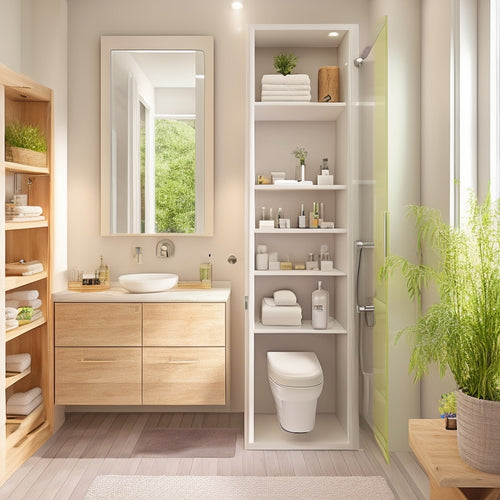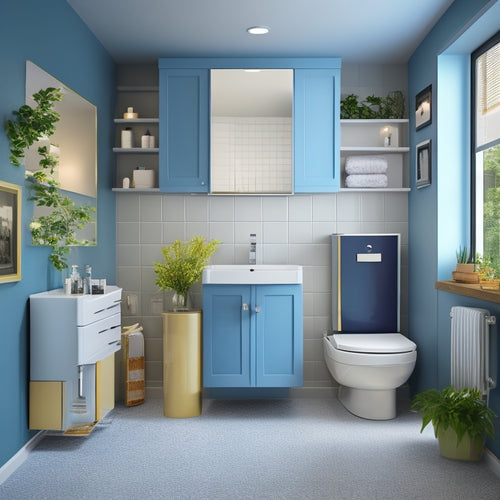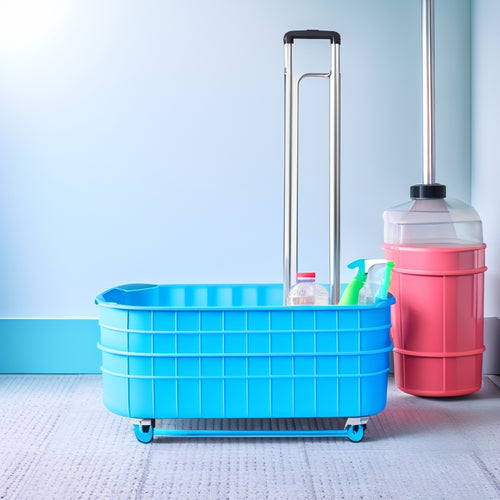
What's Holding You Back From a Clutter-Free Space?
Share
You've envisioned a clutter-free space, but somehow, clutter always wins, leaving you frustrated and overwhelmed. What's holding you back? Is it the emotional attachment to possessions, lack of effective storage solutions, or fear of letting go? Perhaps it's the unrealistic standards you've set for yourself, or the paralyzing fear of imperfection. Maybe it's the overwhelm of coping with limited space or the struggle to break old habits. Whatever the reason, recognizing the obstacles is the first step towards a clutter-free life. By understanding what's holding you back, you can begin to break free from the cycle of clutter and start creating a space that truly reflects your best self.
Key Takeaways
• Emotional attachment to possessions and fear of letting go can hold you back from achieving a clutter-free space.
• Inadequate storage solutions and lack of effective organizational systems can lead to clutter accumulation.
• Unrealistic standards and expectations, such as striving for perfection, can prevent you from making progress towards a clutter-free space.
• Poor time management skills and procrastination can hinder your ability to maintain a clutter-free space.
• Fear of failure, judgment, and imperfection can paralyze you, preventing you from taking action towards achieving a clutter-free space.
Bathroom Clutter Culprits Exposed
Take a closer look at your bathroom countertops and you'll likely spot a clutter culprit: a jumble of hair accessories, skincare products, and expired medications. It's no wonder your morning routines are slowed down by the chaos. These bathroom hazards aren't just visually unappealing; they're also breeding grounds for bacteria and germs.
You're not alone in this struggle. Many of us have fallen victim to the 'it's just one more thing' mentality, leaving our countertops cluttered and our mornings frazzled. But it's time to take control.
Start by categorizing your products into 'keep,' 'donate,' and 'toss' piles. Be ruthless – if you haven't used it in the past month, it's likely taking up valuable real estate.
Next, assign a home for each item. Invest in a few strategic storage solutions, like baskets or bins, to keep your countertops clear.
Fear of Letting Go Syndrome
As you stand in front of your cluttered space, you might find yourself hesitant to part with certain items, even if they no longer serve a purpose. This hesitation often stems from emotional attachment issues, where you've assigned sentimental value to objects that hold memories or remind you of loved ones.
It's essential to recognize that letting go of these items doesn't mean you're erasing the memories, but rather, you're creating space for new experiences and a more organized life.
Emotional Attachment Issues
Your treasured possessions, from grandma's antique vase to your child's first artwork, hold a special place in your heart, making it painfully hard to let them go. These items are tied to memories, emotions, and people that are dear to you. It's natural to feel a strong emotional attachment to them.
| Memory Triggers | Emotional Comfort | Clutter Consequence |
|---|---|---|
| Grandma's antique vase | Feeling connected to family heritage | Dust-gathering decoration |
| Child's first artwork | Pride and nostalgia | Cluttered kitchen fridge |
| Old love letters | Sentimental memories | Boxed-up emotional baggage |
As you hold onto these items, you're not just keeping the physical object, but also the emotions and memories attached to them. This emotional comfort can be a powerful motivator, making it difficult to part with these possessions. However, it's essential to recognize that the memories and emotions aren't in the object itself, but in the memories and feelings they evoke. By acknowledging this, you can begin to let go of the physical clutter and hold onto the emotional significance instead.
Sentimental Value Overload
You're likely guilty of sentimental value overload if every item in your possession is deemed irreplaceable, making it impossible to distinguish between what's truly meaningful and what's just taking up space. This phenomenon is often referred to as Fear of Letting Go Syndrome. You're not alone in this struggle, but it's essential to acknowledge the emotional weight holding you back from a clutter-free space.
Here are three common culprits contributing to sentimental value overload:
-
Family Heirlooms: Grandma's antique vase or Mom's vintage jewelry can be difficult to part with, even if they no longer serve a purpose in your life.
-
Memory Triggers: Items that evoke strong memories, such as a favorite childhood toy or a souvenir from a memorable trip, can be hard to let go of, even if they're no longer useful.
-
Emotional Attachments: Gifts from loved ones or items purchased during significant life events can create emotional bonds, making it challenging to declutter.
It's essential to recognize that the memories and emotions attached to these items are what's truly valuable, not the items themselves. By acknowledging this, you can begin to let go of the physical items and still cherish the memories they represent.
Lack of Storage Solutions
Without adequate storage solutions, clutter tends to accumulate rapidly, making it difficult to maintain a sense of organization and calm in your living or working space.
You might find yourself overwhelmed by the sheer amount of stuff scattered around, and wondering how to tame the chaos. The truth is, effective storage solutions can make all the difference.
Creative Cabinets, for instance, can be a game-changer. Imagine having a sleek, customized cabinet that keeps your belongings hidden from view, yet easily accessible.
Or, consider installing Hidden Shelves that blend seamlessly into your décor, providing ample storage without taking up valuable floor space.
By incorporating these clever storage solutions, you'll be able to corral your belongings, freeing up space and reducing visual clutter.
With a little creativity and planning, you can transform your space into a haven of calm and productivity.
Bad Habits Die Hard Sometimes
Old habits, like cluttered closets and messy desks, can be incredibly stubborn, making it tough to break free from the cycle of clutter that's holding you back. You've tried to tidy up, but somehow, your space always ends up cluttered again. It's frustrating, but don't worry, you're not alone. The truth is, bad habits die hard, and it takes conscious effort to break them.
Here are three common habits that might be holding you back from a clutter-free space:
-
Lazy mornings: Rushing out the door in the morning can lead to a messy space. You're more likely to leave clutter behind when you're in a hurry.
-
Mindless scrolling: Binge-watching or endless scrolling can lead to a sedentary lifestyle, making it harder to find the energy to clean up.
-
Procrastination: Putting off tasks until the last minute can lead to clutter accumulation. The more you delay, the more clutter builds up.
Recognizing these habits is the first step to breaking them. By being more mindful of your daily habits, you can start making small changes that will lead to a clutter-free space. It won't be easy, but it's worth it.
Unclear Goals and Expectations
Setting unclear goals and expectations for your clutter-free space can lead to frustration and disappointment, making it difficult to maintain motivation and enthusiasm for the task at hand. You may find yourself feeling overwhelmed, unsure of where to start, or struggling to stay on track. This is often because your objectives are unclear, leaving you with fuzzy boundaries and unrealistic expectations.
Clear objectives are essential to achieving a clutter-free space. Without them, you'll struggle to create a plan, prioritize tasks, and measure progress. Start by asking yourself what you want to achieve in your space. What does 'clutter-free' mean to you? What areas of your life will improve once you've achieved this goal? Be specific, and make sure your objectives are measurable and achievable.
Unrealistic hopes can also hinder your progress. Don't set yourself up for disappointment by expecting to transform your entire home in a weekend. Break your goal down into smaller, manageable tasks, and focus on making progress, not perfection.
Overwhelming Sense of Perfection
As you aim for a clutter-free space, you might find yourself held back by an overwhelming sense of perfection. You set unrealistically high standards, and the fear of not meeting them paralyzes you, making it difficult to take the first step towards organizing.
It's crucial to recognize that your expectations might be hindering your progress, and it's time to reassess what 'perfect' means to you.
Unrealistic Expectations
You've likely seen those Instagram-perfect images of clutter-free spaces that make you feel like a failure for not being able to achieve the same level of tidiness in your own home. The truth is, those images are often staged, edited, and curated to perfection. They're unrealistic expectations that can lead to feelings of inadequacy and frustration.
Here are three ways unreal standards hold you back from achieving a clutter-free space:
-
Unmet Standards: You set yourself up for failure by trying to achieve an unrealistic level of perfection. You feel like you need to have a spotless home, but that's not realistic for most people.
-
Unreal Standards: You compare your home to someone else's highlight reel, forgetting that everyone has their own struggles with clutter and organization.
-
Unattainable Goals: You set goals that are too ambitious, leading to burnout and discouragement when you can't meet them.
Paralyzing Fear
Fear of not meeting unrealistic standards can paralyze you, making it impossible to take the first step towards creating a clutter-free space, and leaving you stuck in a cycle of procrastination. You're not alone in this feeling. Many people struggle with the fear of not being perfect, and it's holding them back from achieving their goals.
The fear of failure and fear of judgment can be overwhelming. You might think, 'What if I don't do it right?' or 'What will others think of my space?' These thoughts can be debilitating, making you hesitant to start the decluttering process. But, it's essential to recognize that perfection is unattainable. Nobody has a perfectly organized space all the time.
You need to give yourself permission to make mistakes and learn from them. Remember, creating a clutter-free space is a process, and it's okay to take it one step at a time.
Don't let fear hold you back any longer. Take a deep breath, start small, and focus on progress, not perfection.
Inadequate Time Management Skills
Inadequate time management skills can transform your living space into a cluttered nightmare, making it difficult to focus on what's truly important. When you struggle to manage your time effectively, tasks pile up, and clutter accumulates. You may feel overwhelmed, stuck, and unsure of where to start.
To break free from the cycle of clutter, it's crucial to develop effective time management skills. Here are three strategies to help you get started:
-
Prioritize tasks: Identify the most critical tasks that need to be done, and tackle them first. This will help you stay focused and make progress towards your goals.
-
Use time blocking techniques: Schedule specific tasks into fixed time slots, allowing you to stay on track and avoid procrastination.
-
Create a maintenance routine: Set aside a few minutes each day to maintain your space, putting away items, and tidying up as you go.
Space Constraints and Limitations
Living with limited square footage can make it particularly challenging to maintain a clutter-free space, as every inch counts and even the slightest disorganization can feel overwhelming. You're not alone in this struggle. Many people face the same challenge, and it's crucial to get creative with your space.
To maximize your space, consider the following strategies:
| Space-Saving Technique | Description |
| Corner optimization | Use corner shelves or carousels to utilize dead space |
| Vertical utilization | Install shelves or storage units that go up to the ceiling |
| Multi-functional furniture | Invest in furniture that serves multiple purposes |
| Hidden storage | Use storage bins or baskets to keep items out of sight |
Unrealistic Expectations of Perfection
As you work towards maintaining a clutter-free space, you may find yourself grappling with the pressure to achieve perfection, a standard that's often unrealistic and unattainable. You're not alone in this struggle. Unrealistic expectations of perfection can be a major obstacle to achieving a clutter-free space.
Here are a few ways these high standards can hold you back:
-
Unreal benchmarks: You compare your space to others, feeling like yours will never measure up.
-
Unattainable goals: You set impossible standards for yourself, leading to frustration and burnout.
-
Paralyzing fear of imperfection: You're so afraid of making a mistake that you don't take action at all.
Frequently Asked Questions
Can a Clutter-Free Space Really Improve My Mental Health?
"By creating a clutter-free space, you'll experience mental clarity, reduced stress, and a sense of control, allowing you to focus on what matters most and live a more intentional, empowered life."
How Do I Declutter Sentimental Items Without Feeling Guilty?
"Did you know 70% of people feel guilty about getting rid of sentimental items? You can create a Memory Box for cherished keepsakes, letting go of emotional attachment, and still honor the memories, freeing you from guilt and clutter."
What Are Some Creative Storage Solutions for Small Spaces?
You can maximize your small space with hidden shelves, vertical organizers, and foldable storage that doubles as multi-use furniture, while compact containers keep essentials within easy reach, freeing up valuable space.
Is It Possible to Maintain a Clutter-Free Space With Kids?
You can maintain a clutter-free space with kids by establishing kid-friendly rules and incorporating parenting hacks, like labeling storage bins and creating daily tidy routines, to instill responsibility and make cleaning a fun, family affair.
Can I Still Be Creative and Organized With a Clutter-Free Space?
"When you're stuck between a rock and a hard place, don't think a clutter-free space means sacrificing artistic freedom; instead, design constraints can fuel creativity, allowing you to think outside the box and uncover innovative solutions."
Related Posts
-

Modular Bathroom Storage for Small Spaces
Modular bathroom storage is your go-to solution for small spaces, turning clutter into chic organization. Use wall-mo...
-

Innovative Bathroom Storage Solutions for Small Bathrooms
You can access a rich repository of storage space in your small bathroom by cleverly leveraging corners, walls, and h...
-

Revamp Your Cleaning Business With This Checklist
Revamping your cleaning business requires a strategic overhaul of operational inefficiencies, starting with the imple...


